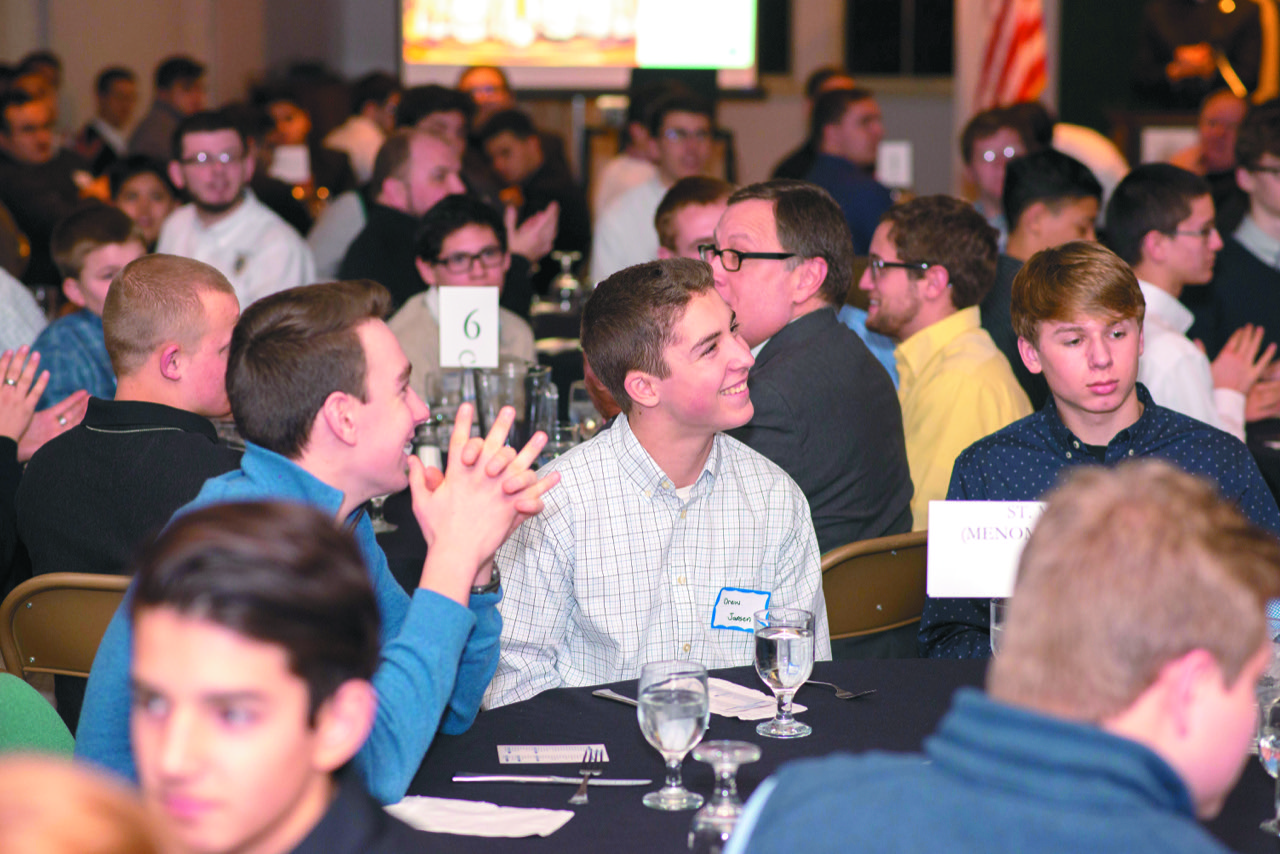Saint Francis de Sales Seminary 175th Anniversary

A St. Andrew dinner is a low-pressure part of the discernment process for aspiring seminarians. (File photo)
From the first tug at the heart and the first sense of God’s wonder capturing the young boy’s heart, he may feel God is calling him to serve the Church. He may wonder if he should become a priest. For more young men, priestly formation begins in the family, continues through the discernment process, is solidified during seminary years of study and pastoral experience, and is confirmed at ordination, where it becomes a lifetime of collaboration with God’s grace and human effort.
Becoming a priest means taking one’s mere human, mortal, sinful state, uniting it with God’s grace and one’s own effort, and witnessing the transformation into an alter Christus, which is Latin for “other Christ.”
The process of responding to God’s call often begins when the Saint Francis de Sales vocation director meets a discerning man at an event or conference and begins the conversation, though a man may also contact the vocation office himself.
Other steps include the discerning man or young adult speaking to his pastor or parish priest about his desire to become a priest, said William J. Hudson, director of admissions and associate director of vocations and formation at Saint Francis de Sales Seminary.
“We have a vocation director/office and we could meet with the interested man, provide guidance, resources and make them aware of events,” he said. “Depending on the age of the man, we offer day camps, overnight camps, young adult events and the St. Andrew Dinners.”
The St. Andrew Dinner is intended to bring men together who are considering a vocation to the priesthood. It offers a relaxed atmosphere and includes a time for prayer, a meal, and an opportunity to listen while the bishop/archbishop speaks about his journey to priesthood. It offers a pressure-free atmosphere of discussion and dialogue about the life of a priest and a priestly vocation. These dinners are named after St. Andrew who, in the Gospel according to John, brought his brother Simon Peter to meet Jesus.
Once the vocation director gets to know the candidate, discovers where he is in the discernment process, and discusses his prayer life, the vocation director will then: establish a spiritual plan of life with the man; encourage his involvement in a parish or community; find him a spiritual director if he doesn’t have one; and offer other areas of growth and personal focus.
“The vocation director often spends two to three years walking with the man in discernment before his application,” said Hudson. “Other parts of the process include monthly communications, phone calls, meetings, vocation events and an invitation to reside at the JPII House of Discernment.”
Following a lengthy interview with the candidate, that includes questions about family, work, ecclesial involvement and relationships, the vocation director may offer the man an application to the seminary.
“Once the application is filled out, he would write a personal statement and autobiography and then participate in several interviews,” said Hudson. “This is specific for the Archdiocese of Milwaukee, where an applicant would have three interviews with priests from our archdiocese, then participate in a full psychological exam. Normally, this would include a day or more of testing.”
Other requirements include: a full medical exam; canonical forms; and five letters of recommendation, including one from his pastor and one from a relative.
The admissions board consists of the rector, director of admissions, two priests and two lay members with formation experience. The group meets nine times per year to consider applications. For each candidate, the board hears oral reports from the three priest interviewers and the psychologist.
Following discussion, the board makes recommendations to the rector, who ultimately makes the final acceptance decision. The admissions director notifies the candidate by email and postal mail.
There are currently 50 seminarians living in the house, but not all are from the Archdiocese of Milwaukee. Currently, 32 are from Milwaukee and 18 from other dioceses.
“Every diocese conducts their own admission process to determine if that man will become a seminarian for that diocese and then if accepted, they are sent to a particular seminary, where the seminary conducts their own admissions process to determine whether the candidate can enter the seminary,” said Hudson.
While the process might seem daunting, Hudson encourages those who feel called to the priesthood to confide in their parish priest in order to help determine their motive for wanting to enter seminary and whether it is an authentic call. Candidates are also encouraged to participate in many of the discernment events and to contact the vocations office for more information and support. Though many parents are supportive of their sons’ decision, some men do not have the backing of family.
“We also run into situations on helping the men with discernment as there are lots of moms and dads who are not open to their sons becoming priests and that is becoming more of a problem than we had before. It used to be that a mom or dad wanted their son to become a priest, but they may not have felt called to that vocation,” said Hudson. “These days, some parents are reluctant due to their perceived hopes and dreams for their sons, or concerns about the sex scandal. There are many reasons, but it ultimately depends on the guy and his call; there are many parents who are still thrilled to have their sons in the seminary.”
